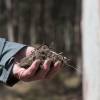
Day in the life: Forest Practices Officer
Posted 19 April 2024
Forest Practices Officers are trained and appointed by Tasmania’s independent forestry regulator, the Forest Practices Authority. While FPOs have legal obligations to the FPA, they are employed in the forestry sector or work as independent consultants, offering specialist knowledge to support farmers to plan forestry activities.
Hafwen Pearce is an FPO working in Northern Tasmania, and we asked her what a day in her life looks like.
“It all starts with a plan, a task and intent. Your task may be to assess a coupe for special values, or visit a harvesting operation to check a newly formed road is compliant, or undertake a regeneration assessment.
“Within and behind all these tasks (and there are many more) lies training, procedures, knowledge and experience that take years to develop as an FPO.
Connecting regulations with operations
“The forest practices system is co-regulated so, as an FPO, that means you wear two hats: one as a delegate for the FPA, and the other as a planner or supervisor for a company.
“You are required to balance these two objectives to ensure legal and commercial forest operations. This takes both integrity and professionalism to navigate through conflicting objectives.
“My favourite part of being an FPO is being in the field developing a plan ready for harvesting.”
“It seems straightforward, but there are always competing objectives for values identified in the forest: flora, fauna, soil and water, landscape, and Aboriginal and European cultural heritage. When you are preparing a Forest Practices Plan, you get to know your landscape and history of the place.
“You could be in Glover country, or be looking for Aboriginal stone flakes near streams, or looking for tramways and pig ovens. The countryside is soaked in heritage and history that, as an FPO, you have the opportunity to explore.
“The stories that go with the landscape are deep, the townships and dwellings throughout the bush are remnants of a pioneering life and it’s all there to find if you are looking carefully.
Covering all angles
“Managing these cultural and environmental values must go hand-in-hand with considering the economic and social implications of landholders’ operations. There are a number of production and commercial considerations to ensure viability.
“These include: do you have a commercial volume? Do you have legal access? What sort of wood product will you recover? Have you got the right machinery mix for the timber and ground conditions? What time of year should you be in the coupes? Are markets good for the sale of product? Will the harvesting operation be profitable? Are there lease or license constraints, community groups or neighbours’ considerations? Have you appropriately considered the aesthetic impact on the landscape?
Supporting landholders
“The complex responsibilities of an FPO are a culmination of years of training and mentoring, generations of trials and improvements, of lessons learnt, research, and a shared experience of an industry that has evolved and developed an environmental consciousness that contributes to a sustainable forest industry today.
“We share that knowledge with landholders. We’re available to discuss plans and guide landholders through the process so they can make informed decisions about their forest practices. Many FPOs also work with forest owners to prepare Forest Practices Plans and ensure they are legally compliant.
“It’s simple to get the ball rolling: landholders can contact an FPO through the FPA’s contact list.”
Access the FPA contact list from fpa.tas.gov.au/landowners or learn more about the legal considerations of trees on farms with the Tree Alliance Knowledge Hub at treealliance.com.au
Share this Article
Latest Articles
-

20 October 2025
Tasmanian High Soil Carbon Landscapes project
-

17 September 2025
Celebrating excellence at the Tasmanian Timber Awards
-

17 September 2025
Forest Practices Authority Research Update Day
Archives
- ActivAcre hits milestone, calls for more farmers to get on board
- Napier's leading the way in sustainable forestry and carbon-neutral farming
- Sound science needed to assess carbon impacts of timber harvesting
- Newly appointed TFFPN Board of Directors
- Graduate Certificate of Forestry Scholarship
- Forestry Australia Mentoring Program 2025
- Forest Industry Roundtable planning for the long term
- Eagle Management Constraint Period extended
- Successful private native forest management celebrated
- $15 million investment in new ship loader to boost Bell Bay's forestry exports
- Standing with Tasmania's forestry industry: buy local
- TFPA: Tasmanian Freight Equalisation Scheme needs a ground-up review
- AFCA Gala Dinner celebrates industry excellence
- Fire permits now required Statewide
- Forest leaders hone skills in sustainable native regrowth management
- Tasmanian forests and the carbon market: Barriers and opportunities
- What the 2024-25 Tasmanian Budget means for forestry
- Spring is the time for fuel reduction burning
- Primed for Growth: A situation analysis of the Tasmanian Forest and Wood Products Sector
- Audit requirements cut for low-risk plantation projects
- Guidance and support for landowners after damaging winds
- Forestry Australia welcomes further definition of active forest management
- Farm & Forest Mapper Tool highlighted at Rural Youth Tasmania's Young Farmer of the Year competition
- Senate Select Committee inquiry into the Tasmanian Freight Equalisation Scheme
- Timberlink announces new wood composite products brand
- Newly developed protocol a vital tool for safeguarding forestry industry
- Red Hot Tips: Fire management for Tassie farmers
- Bioenergy: Fuelling industries with trees
- Harvesting trees: What you need to know
- Shelterbelts: How are they contributing to farm systems?
- Infill plantings and remnant vegetation: Why biodiversity depends on a thriving understory
- Plantation planning: The key to a successful plantation
- Exciting interactive forestry knowledge hub launched
- $450,000 farm forestry grant recipients revealed


